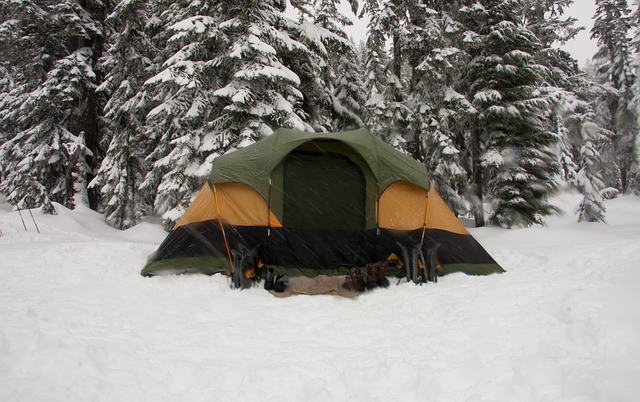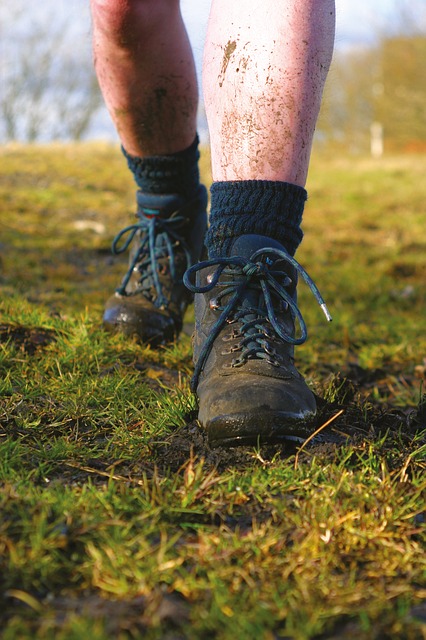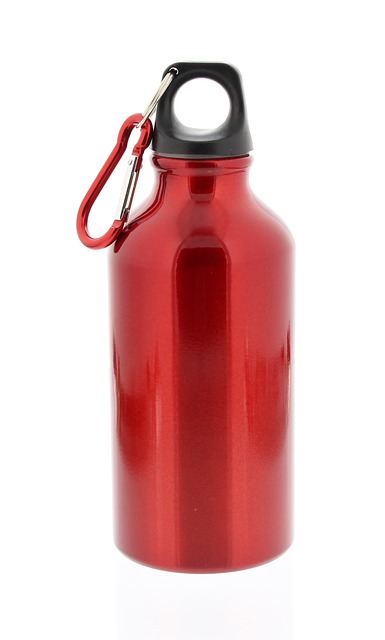Winter is a very harsh season, however for us camp goers it can mean the difference between staying home in the winter and keeping toasty by the fire, or going out in the cold to camp, while appreciating the entirely different landscape Mother Nature has to offer.
The winter landscape is so much different than during the summer. So if you would like to take your camping experience to the next level, then winter camping is definitely for you!
I suggest you read my winter camping tips below to find out the secrets to having a better experience than just going out on the field and winging it.

Know The Temperatures Of The Location
Get a good idea of what temperatures you’ll be experiencing before you even get there and be prepared for them.
Without proper research you’ll be risking your life, as humans can only survive 3 hours in extreme cold conditions.
If you don’t know how far the temperatures can drop to in the location you’ll be camping in, you’re more than likely going to experience a colder trip than you thought.
Keep Clothing Loose But Layered
Condensation is a real thing, and many people make the simple mistake of packing on clothes and tightening them up thinking this is going to keep them toasty warm.
However that is quite the opposite. Condensation is just going to build up inside those layers of clothes, turn to water and then make you even colder than before.
It is ideal to keep your clothes loose so there’s enough ventilation, but keep them layered for overall warmth.
Drink ‘More’ Water Than In The Summer
It might sound a bit weird right now, however your body actually uses more of the liquid while trying to warm you up.
Dehydration is also common for winter campers, due to the brain not receiving as much clues (not much sweating, and usually don’t feel as
thirsty), so we think we don’t actually need much water but we do.
Pro Tip: Keep your water bottle well-insulated for a morale boost, plus warm liquids increase your incentive to drink more.
Remember that you can check the color of your urine to see if you are dehydrated or not. Urine will be light-colored or clear when you are properly hydrated, and yellow or golden-colored if you are dehydrated.
For Temperatures Below Zero *F
As I said before, it’s best to find out how low the temperatures drop in the location you will be camping in.
Losing heat is a serious problem while out camping, your first line of defense against the evaporative heat loss is by using a VBL (Vapor Barrier Liner).
Such items that are good can be: rain poncho, emergency foil blanket, or any other plastic sheet. Using one of these is also going to stop the water from freezing up around the edge of your sleeping bag.
Wear Minimal Clothes In Your Sleeping Bag
This might sound counter intuitive, however many people still make this simple mistake. Sleeping bags are designed to hold heat in to keep you toasty warm.
If you decide to pack on the clothes, you’re not only going to get condensation build up under all those layers, you are also stopping the heat that the sleeping bag is holding from reaching you.
A pair of boxer shorts, mens boxer briefs, or mens underwear is good for bottoms. For your torso it’s best to wear a light t-shirt or singlet.
Keep Sensitive Areas Covered
We lose 70% of our body heat through our head, and where do we lose most of the remaining percent?
Through our sensitive areas – neck, wrists, knees, ankles. Cover all these areas up to hold the heat in.
We don’t lose all heat through these areas, however once I started covering them up I noticed drastic improvements. If you start getting too hot, simply take your first line of defense off – your beanie.
Pro Tip: Wear a balaclava for a 2 in 1 approach. You get to keep your neck AND face warm.
More tips for camping in cold weather.
Eat Extra Fat
You burn more calories during the winter, you can counter this by eating 40 grams of butter at every meal. You need more fat to stay warm, without eating that extra fat it will be harder for you to keep warm.
Make Eating And Drinking A Routine
When you’re out exploring, it can be quite difficult to remember to stop and fuel up.
Have a strict schedule so every hour you are out and about, stop for 5-7 minutes for a drink and snack.
Here’s a list of easy meal ideas.
Don’t Sweat
For the love of god, don’t think that running around or moving quickly to warm up is going to be of any benefit to you. If anything it’s going to be the complete opposite.
Your sweat glands are designed to cool you down, when you stop moving you are quickly going to be very cold.
If you feel yourself heating up too much, just unzip your jacket to cool off a little bit. If you are overheated, then take off your beanie.
Avoid Cotton Clothes
In the winter, cotton kills. Cotton will lose its insulating abilities when it gets wet, whether that be from rain, sweat, or condensation. It also takes a long time to dry out!
You have a better chance of keeping warm if you choose to wear wool or synthetic materials, this is what a lot of advanced winter campers will use.
Don’t Keep Clothes Tight
We have a tendency to wear clothes and accessories tight.
However if you decide to wear too many pairs of socks thinking that you will keep extra warm, this will just restrict blood flow to your feet, resulting in being colder than before.
This works the same for other areas. Tightening your bootlaces too much will also cause this problem.
Make sure your gloves and the liners aren’t too tight on your hands, this will just stop maximum blood flow as well.
Drying Socks And Gloves
I would recommend you carry a few extra pairs of socks and  gloves, for the simple fact that if one gets wet, you will have a back up or two.
gloves, for the simple fact that if one gets wet, you will have a back up or two.
As the saying goes “If you have 2, you have 1, if you have 1, you have none”. This means without a backup you don’t have any, and the chances of something getting wet in the wild are pretty high.
However you can dry a pair of socks or gloves overnight, simply by ringing them out first then placing them inside your sleeping bag as you sleep.
It is preferable to keep them close to your body to ensure they will get completely dry.
Conclusion
Although the outdoor, winter scenery is much different to the summer views, the way of staying in Mother Nature is completely different as well.
It’s not just a matter of taking an extra pair of blankets and clothes and saying you are ready for your winter bush excursion, because if it was, then already one would be doing it.
No, it is much more complicated than that and only recommended for experienced outdoorsman.
However, with the help of some winter camping tips it won’t take long before you know what you can and can not do.
I really hope this article helped you out, and if it did – please leave a nice comment below and tell me what tip you enjoyed the most!
Otherwise, I think you’ll like knowing how to keep your tent warm while camping.



I learned a few things like condensation, dehydration, using a VBL. Knew about losing heat through the head but didn’t know about the other areas. I didn’t know about cotton clothes. Extra socks and gloves is a great tip. I think I like the tip about eating extra fat the most. I love camping. I went camping in the winter once when I was a kid. It was a lot of fun. What’s the lowest temperature you’ve camped in?
Hi Gary! Believe it or not, but if you cover up these sensitive areas alone, taking into consideration that you are wearing average clothes, you’ll feel extremely warm just from doing this step! I couldn’t believe it when I tried it, so make sure you give it a go and let me know what you think 🙂
And I’ve camped in temperatures below 0 degrees. Sometimes around -20 C. You need a GREAT, expensive sleeping bag if you want to stay warm though.
What a great article! I learned so many new things. I never thought about tight clothes being such an obstacle to feeling warm. Also dehydration in winter sounds so logical. Thank you for writing this article and giving us a chance to learn from your experience. I love your website, keep up the good work!
Tight clothes is by far one of the worst mistakes people make. They wear tight clothing in the hopes that it will keep them warm, yet it only encourages condensation build up, resulting in being extra cold – sometimes worse than before!
I have never camped in the winter. It seems like it would be too cold to stay warm. After reading your article I would actually like to try it.
Reading through your article there are so many preconceived ideas that are just wrong. I thought you need layers of clothes when sleeping and you have put that to rest. Needing more water in the winter was another fact I was unaware of.
Thank you for your expertise in the area of camping. I will come back to your site for more information.
Best regards!
It’s a lot easier when you know how to stay warm, so I definitely recommend it because once you learn how to do that your experience will be amazing. I’m glad that you learned a thing or two Jan.
Thanks for stopping by,
Brandon
Some great tips here to keep you warm and toasty during the winter!
I loved to camp almost every weekend when I was younger but it is getting harder for me to deal with the cold anymore.
Great website, keep up the good work!
Shawn>>
I totally get what you mean, Shawn. Camping can be a real struggle in this day and age. We are so busy with our technology and work, we never take time to enjoy the beauty of our world. I hope you can get out there soon. Cheers!
Well, you just set my butt right about quite a few things & I play outside a lot. Got me totally stumped when you said about drinking more water in the winter, totally didn’t see that at all and the advice about sleeping in a sleeping bag with less clothes on. I think would have to camp in my backyard & try that before I went in the wild, I know my mind will fight me, though eating more butter sounds really enjoyably easy!!!! Thanks for such a great article!
Hello Donna. So many people don’t realize how easily you can get dehydrated from being in the COLD for long periods of time. It sounds so counterintuitive, but it definitely does happen – and yes, you can get hydrated FASTER on a really cold day than a normal day! Thanks for the comment 🙂
Winter is just around the corner here in Canada and I was thinking about doing something outdoorsy. Funny how what you immediately think might warm you up or protect you in colder weather may actually do the opposite! Thanks for these great tips, Brandon!
Hello Andrea! Yes, condensation can build up extremely easy in outdoor weather, a little knowledge will go a long way 🙂